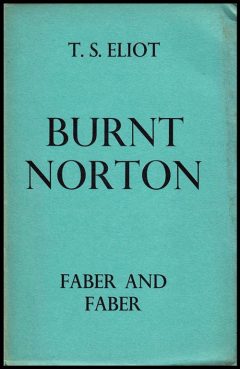Burnt Norton

Release Date: //1936
Country of Release:
Length:
MPAA:
Medium: Literature
Genre:
Release Message: Begins with "Time present and time past / Are both perhaps present in time future..."
Description: Begins with "Time present and time past / Are both perhaps present in time future..." Time present and time past Are both perhaps present in time future And time future contained in time past. If all time is eternally present All time is unredeemable. Burnt Norton is the first poem of T. S. Eliot's Four Quartets. He created it while working on his play Murder in the Cathedral and it was first published in his Collected Poems 1909_1935 (1936). The poem's title refers to a Cotswolds manor house Eliot visited. The manor's garden served as an important image within the poem. Structurally, the poem is based on Eliot's The Waste Land with passages of the poem related to those excised from Murder in the Cathedral. The central discussion within the poem is on the nature of time and salvation. Eliot emphasises the need of the individual to focus on the present moment and to know that there is a universal order. By understanding the nature of time and the order of the universe, mankind is able to recognise God and seek redemption. Many reviewers of Burnt Norton focused on the uniqueness and beauty of the poem. However, others complained that the poem does not reflect Eliot's earlier greatness and that the use of Christian themes harmed the poem.